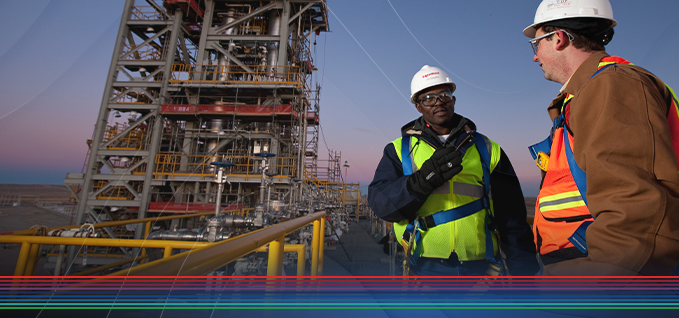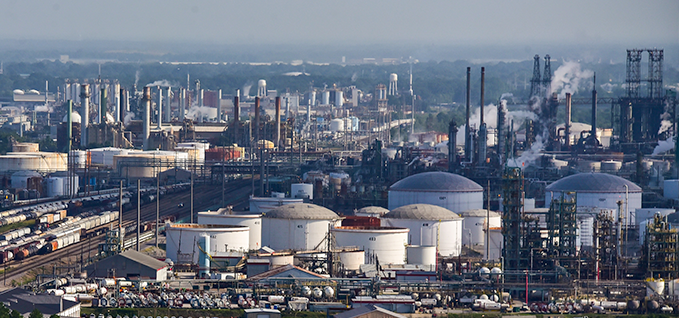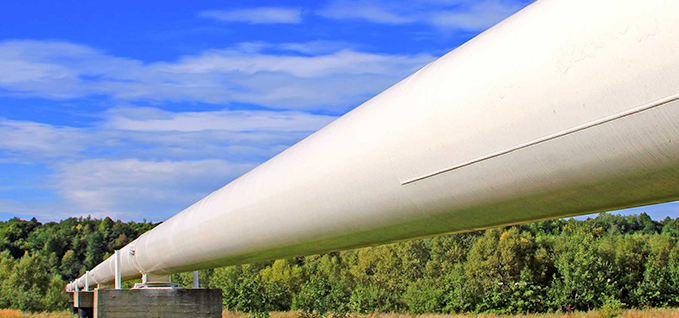CO2 has been transported safely by pipeline for decades. There are approximately 5,200 miles of pipelines carrying CO2 in operation in North America. However, to enable the expansion of the use of Carbon Capture, Utilization and Storage (CCUS), experts anticipate our region will need a significant increase in the size of the CO2 network.
ExxonMobil Pipeline Company is supporting ExxonMobil Low Carbon Solutions' CCUS projects by helping build new pipeline segments connecting its existing CO2 pipelines to additional storage sites. With decades of experience operating underground storage sites for various energy products, ExxonMobil Pipeline Company also will safely operate and monitor the subsurface CO2 storage sites once they start operations.
Building new CO2 pipelines will lead to long-term benefits for our environment and local communities, our energy industry and our nation.
 About carbon dioxide
About carbon dioxide
Carbon dioxide (CO2) is a colorless, odorless gas and is everywhere. Humans exhale it. Plants live on it. It gives soft drinks their fizz. In addition to it being a naturally occurring gas, it is also created when we burn oil or natural gas as part of the manufacturing process or to generate electricity.
CO2 plays an important role in the atmosphere. It helps trap the sun’s heat, warming our planet and protecting it from the frigid temperatures of outer space. However, too much CO2 in the atmosphere traps too much heat and risks raising the earth’s temperature.
Many things we do and use produce CO2 including cars, planes, agricultural equipment, and the manufacturing of countless daily essentials and building materials such as steel and concrete. Unfortunately, as the world works to limit the level of CO2 in the atmosphere, we will either need to limit these activities or reduce the amount of CO2 these activities produce. If we can capture the CO2 at the manufacturing site before it is released to the atmosphere, we can continue to benefit from activities and products that produce CO2, while meeting climate goals.
 Carbon capture, utilization and storage
Carbon capture, utilization and storage
Carbon Capture, Utilization and Storage, or CCUS, is a process that will allow industries that emit carbon dioxide (CO2) to both maintain operations and reduce CO2 emissions. First, it uses special equipment to remove the CO2 from their facilities’ exhaust before it reaches the air. Once captured, the CO2 can either be provided to companies for other uses or transported by pipeline to an underground storage area for safe and permanent storage. The same type of impermeable rock layers that have kept oil, natural gas and naturally occurring CO2 locked underground for millions of years can safely store CO2.
To help develop their CCUS systems, companies that produce CO2 are working with oil and natural gas companies since they are experts at transporting and storing liquids and gases. These systems will require building carbon capture equipment at the source, pipelines to carry the captured carbon away from the source and wells to bury the CO2 safely and permanently underground.
 Benefits of CCS
Benefits of CCS
-
Building CCUS projects will generate new investment dollars, create new, well-paying construction jobs, and generate additional tax revenue for use at the state and local levels.
-
By capturing the carbon dioxide (CO2) produced before it reaches the air, companies will manufacture products that will be even more competitive in markets that require lower-carbon footprints.
-
Carbon capture, utilization and storage projects will support the well-paying jobs at manufacturing facilities that produce CO2. By reducing their carbon footprint, CCUS will allow these companies to continue operations as well as use available, affordable and reliable sources of energy.
-
For individuals, CCUS will mean the ability to maintain today’s lifestyle, which is heavily derived from oil and natural gas, because energy production and products we enjoy can be significantly decarbonized.
 CO2 pipelines videos
CO2 pipelines videos
 Breaking down the process
Breaking down the process
Capturing, transporting and safely storing carbon dioxide (CO2) emissions is a proven process that will create a new industry and help sustain jobs in industries that produce CO2. Learn more about each element of the CCUS process.



